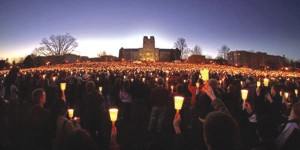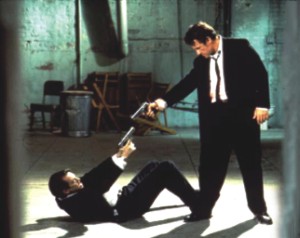| Food for Thought
Money-making, Misinformation and Mass Murder
Farah Ghuznavi
 There was a disturbing sense of familiarity about news reportage emanating from the mass shooting at Virginia Tech University last month. A total of 33 people - students, staff members and the gunman himself - died in the frenzy of violence at the prestigious academic institution. Once again, America mourned, with obsessive media coverage, apparently endless self questioning (which still somehow managed to avoid dealing with some of the key issues behind this event) and candlelight vigils and prayer meetings. There was a disturbing sense of familiarity about news reportage emanating from the mass shooting at Virginia Tech University last month. A total of 33 people - students, staff members and the gunman himself - died in the frenzy of violence at the prestigious academic institution. Once again, America mourned, with obsessive media coverage, apparently endless self questioning (which still somehow managed to avoid dealing with some of the key issues behind this event) and candlelight vigils and prayer meetings.
Yet, the fact is that apart from the great number of lives lost, much of the story covers familiar terrain: the sudden burst of violence that characterises such "spree killings", the lone gunman whom no one recognised as constituting a serious threat, the lack of a clear motive beyond apparent alienation and a murderous desire for revenge, the flawed response by security forces to a potentially dangerous situation; and above all, again and again, the frighteningly easy access to firearms in the US.
Despite the earlier incidents of mass shootings such as the well-publicised Columbine massacre eight years previously, it remains questionable whether the American authorities have learned the lessons for mitigation offered by those tragedies. For example, while intervention at Columbine was late and chaotic, there is yet to be a clear explanation for why the campus at Virginia Tech was not immediately sealed off and the students warned, after the first two victims of the massacre were discovered; particularly since the killer, Cho Seung-Hui, took time out after the two initial murders to post pictures and video to a national television network…!
Like abortion and the death penalty, gun-control remains a highly emotive issue in the US. Despite periodic killing sprees, of which the Virginia Tech incident is merely the latest (although, so far, the deadliest), America's love affair with guns does not appear likely to end any time soon - not least because of the enormous financial resources and political influence of the gun lobby, which has particularly strong support among some Republican politicians. Despite efforts to restrict sales of firearms, the fact is that even the limited controls introduced during the Clinton era have been watered down during George Bush's time in office.
The statistics are grim. Roughly 29,000 people in the US are killed by each year by firearms; of these, around 11,000 are murdered, 17,000 use guns to commit suicide, and almost 1000 die in accidents. Breaking down the statistics provides an even more disturbing picture; across the United States, three children under the age of 19 die every day from gun wounds, and 1000 crimes involving firearms are committed every 24 hours! (UK Independent)
Despite statistics that to many would seem to be a self-evident argument for greater gun control, it remains inexplicably simple to obtain a firearm in most parts of the country. In the case of Cho, the perpetrator of the killings at Virginia Tech, the 23-year-old paid $570 for a semiautomatic pistol and a box of 50 cartridges, providing three different forms of identification and passing an additional security check carried out by state police. Without a prior record, there was nothing to hamper the transaction, which took no more than 20 minutes!
Although Cho's weapon of choice was a pistol, he could have just as easily obtained a tactical rifle, a sniper rifle, or an AK-47 semiautomatic assault rifle, all available at the same store. As for the store owner, John Markell, questioned about the killer, he later said "I don't know anything about him. I just sold him the gun." That really says it all...
 |
Films like 'Reservoir Dogs' glorify violence. |
While the gun-buying laws are a little stricter than they were a generation ago, there has not been much progress since then. Lawmaking on this issue takes place at two levels: Federal and State, and while federal laws tend to take the lowest common denominator approach, individual state laws around gun-control vary hugely. Analysis indicates that traditionally Democratic states on both coasts (such as California, Massachusetts and Maryland) have the toughest regulations, while hunting-addicted Texas is rather more lax, and the southern state of Alabama has no limit on handgun sales, no state checks on guns, no registration requirements and no restrictions on minors possessing handguns!
Within this range, Virginia gun laws are generally considered to be permissive, with the state legislation limiting handgun sales to one a month per person (unbelievable or what?!) It is very easy to get a gun; all that is required is a background computer check and a three-day waiting period, meaning that anyone with a clean criminal record and a little patience can get one. Indeed, it is estimated that the gun population of the US is roughly equal to its 300 million human population (UK Independent).
Despite the high human cost and public mourning over incidents such as the 1999 Columbine shootings, or the execution of five little girls at an Amish school in Pennsylvania last year, there appears to be little political will to strengthen gun laws in America. Undoubtedly, this is also a reflection of the financial clout and aggressive lobbying of the weapons industry it is indeed “all about the money”.
An indication of this can be seen from the 1994 legislation banning semi-automatic assault weapons being allowed to lapse in 2004 - largely because of pressure from the pro-gun lobby group, the National Rifle Association (NRA). The influence of this powerful lobby group is further boosted by the fact that there appear to be few new votes to be won by tighter curbs on gun ownership, which inevitably influences the approach of vote-hungry politicians of all shades.
According to the supporters of gun ownership, it is specifically encouraged by the Second Amendment of the Constitution, which endorses militias and the right of citizens to bear arms. According to Leane Anderson, a firearms instructor and gun-shop owner, purchases have soared since the Virginia massacre, "I think guns don't kill people, people kill people. And I'm a strong believer in being able to protect yourself and your family The Second Amendment is very important to me. If it was taken away I'd be very upset." For some of us, of course, this might beg the question of why anyone would need to protect their family by owning and using a firearm in a modern, industrialised, 21st-century democracy.
The logic used by another gun owner, Duane Wilder, that if the Virginia killer "had not got guns, it would have been something else…People crash cars into people" also leaves something to be desired; not least because of how much less damage he could have done with a car relative to a semiautomatic weapon. But the most outrageous claim must be the suggestion from some pro-gun lobbyists that the reason that Cho managed to kill 32 people that day was because there were not enough gun-toting students on the Virginia Tech to kill him before he could do so! It would be laughable if it were not so obscenely misleading an argument.
Much has been made of the fact that the Virginia Tech killer was "Korean-born". While this is true, it is less commonly known that Cho's family actually moved to the US when he was just eight years old; and therefore his formative influences (not to mention his unbalanced sense of rage and hostility) are most likely to have resulted from his experiences in America, rather than his early childhood in Korea. According to the author of the book "Kids and Guns", Mike Males, it is impossible to "find another country where mass shootings are so common outside of war or revolution, regardless of their other characteristics."
 |
Police arm themselves outside Virginia Tech. |
The glorification of violence in Hollywood films such as "Reservoir Dogs" and the saturated media coverage of mass killings are only likely to make the situation worse. On the day of the Virginia massacre, wire services reported the deaths of 56 people in violence in Iraq, the trial in absentia in Italy of a US soldier accused of shooting dead an Italian intelligence agent, and the report that North Korea might be about to shut down a key nuclear reactor - not to mention the fact that somebody shot dead the Mayor of Nagasaki. But all of this was completely overshadowed by the coverage of events at Virginia Tech.
After the news media broadcast video footage of the killer posing with his weapons and ranting about "snobs" and "brats" who had supposedly driven him to these actions, it was not only the families of the victims who objected to the publicity he received. As one FBI specialist warned, this also raises the fear of so-called "copycat incidents", whereby other alienated or isolated individuals - who are essentially bent on committing suicide - decide to take as many others as possible with themselves in some insane fantasy of "guts and glory".
In the end it may indeed be true, as NRA members claim, that "Guns don't kill people, people kill people". But that still leaves the unavoidable question of whether politicians and the public do not then have an active responsibility - through legislation, education and law enforcement - to ensure that guns are not so easily obtainable that they end up in the hands of people who want to kill people...
Copyright
(R) thedailystar.net 2007 |
|
